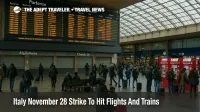Rail Strike
Rail strikes can be a major disruption to travel plans, causing delays and cancellations to rail journeys and the associated knock-on effects. They can also affect anyone who lives or works near the affected rail lines. With up to 78 percent of the UK’s railway system operated on by private companies, it’s important to understand how a rail strike can disrupt travel and what can be done to work around it.
A rail strike is when a significant number of railway staff members do not show up or refuse to work in protest of disputes or issues with the organisation they work for. This might include disputes about wages, safety, working hours or job security. Rail strikes are relatively rare, with the UK having had only 1 in 2019.
For a rail strike to take place, a vote must be held by the workers, usually a trade union, who represent them. Workers must vote in favour of the strike in order for it to go ahead. Once the vote is taken and the strike is approved, there is usually a period of notice given before the strike takes effect. This gives people a chance to plan ahead and arrange alternative forms of transport.
Once the strike is underway, a range of different options are available to commuters and other rail users. The first option is to use alternative forms of public transport. The National Rail service will usually provide updated information on any buses, trams or ferries that can be used as an alternative. If you’re going to use a bus service, however, it’s important to check for any changes to its timetable due to increased demand. It’s also possible to take taxis or hire a car to get around, although this is likely to be more expensive than other forms of transport.
If you’re heading further afield, the best thing to do is to use an alternative form of transport such as a plane or a coach instead of a train. Keep an eye out for discounted flight tickets or coach fares which could help alleviate some of the extra costs caused by a rail strike.
It’s also advisable to plan ahead as much as possible. If you know that a rail strike is taking place, research the train times, check alternative forms of transport, and explore possible routes and timetable changes so that you’re ready for any disruption. If you’re travelling for business, checking in with your employer to find out whether alternative methods of transport will be covered could be necessary.
If you’re travelling during a rail strike, patience and flexibility are key. Try to remain calm and don’t let the delays affect your decision making process.
If you’re intending to use the National Rail service while there’s a strike, then it’s important to know that you may be entitled to compensation should your journey be disrupted. If you’re travelling by train during a strike, you’re usually eligible to be refunded the full cost of your fare, regardless of the delay or cancellation. You will usually be refunded in the form of a voucher that can be used at a later date.
It’s important to bear in mind that there can be serious disruptions to travel caused by a rail strike. This could be inconvenience and disruption to your daily travel route or delayed journeys that could have a severe impact on business or leisure trips. It’s important to always stay informed about any strikes that are taking place, and use alternative means of transport to avoid lengthy delays.
Belgium Strike Days Hit Brussels Airport Transfers Feb 10

Spain Rail Strike Recovery Leaves Trains Uneven Feb 10

Spain Rail Strike Called Off, Feb 9 to 11 Train Plans

Genoa Rail Works Cut Italo Trains Feb 6 to 9

Milan Trenord Strike Hit Airport Trains February 2
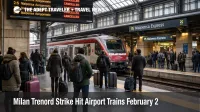
Germany Transit Strike Disrupts Berlin Transfers, NE Rail

Spain Rail Strike Feb 9 to 11 Hits Trains Nationwide

Milan Rail Strike Hits Malpensa Express Feb 2, 2026

Lombardy Rail Strike Hits Malpensa Express Feb 2

Belgium Rail Strike Daily Timetable Through Jan 30

Belgium Rail Strike Eurostar Connections Risk Jan 30

Spain SEMAF Rail Strike Feb 9 to 11 Train Disruption

Belgium Rail Strike Cuts Trains Through January 30

Belgium Rail Strike Disrupts Trains Jan 25 to 30

Spain Rail Strike To Disrupt Trains Feb 9 to 11

Paris Rail Strike Disrupts Trains January 13, 2026
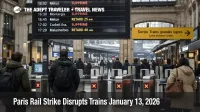
Belgium Rail Strike SNCB Trains, Minimum Service Rules
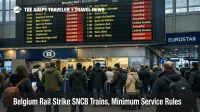
Belgium Rail Strike Cuts Trains Jan 25 to Jan 30
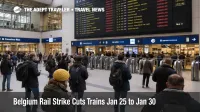
Genoa Intercity Strike Disrupts Liguria Trains Jan 8

Belgium Nationwide Rail Strike Hits Trains Jan 26 to 30
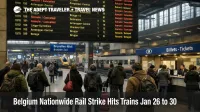
Belgium Rail Strike Disrupts Trains Jan 26 to 30
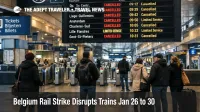
France Rail Strike To Disrupt SNCF Trains Jan 13, 2026

UK December Rail Strikes Called Off On CrossCountry
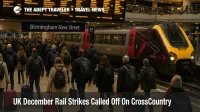
Spain High Speed Rail Strike To Cut Madrid Trains Nov 25 27
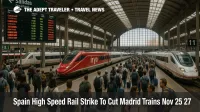
Italy November 28 Strike To Hit Flights And Trains
